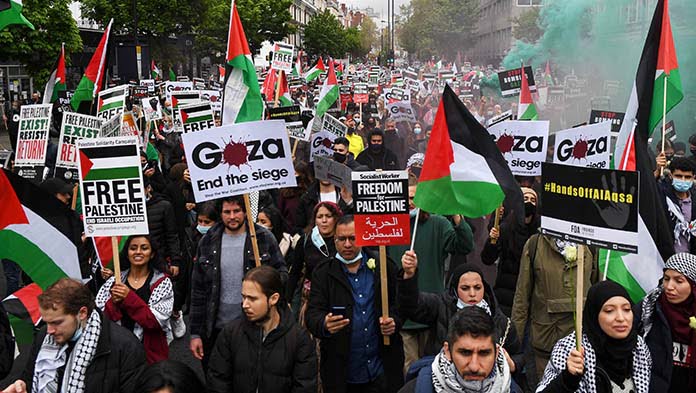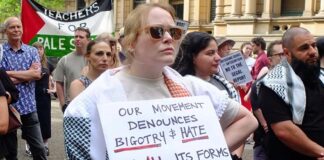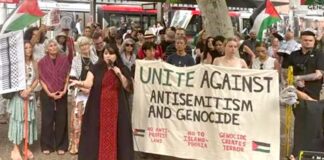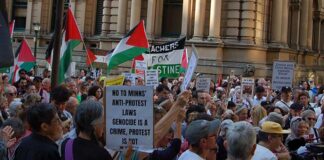From Kerala to Cairo, people are taking on their own governments in the fight for Palestinian lives in Gaza. Government protest bans and censorship have only amplified the solidarity protests across the world since 7 October.
Protesters made a mockery of NSW Labor premier Chris Minns’ attempt to ban pro-Palestinian marches on the Opera House and at Town Hall, with about 20,000 people protesting in Sydney over consecutive weekends. On 5 November, more than 50,000 rallied in Melbourne.
Likewise, protesters have broken the blanket ban on pro-Palestine protests in France, with thousands gathering in both legally sanctioned and defiant protests.
Hundreds in Paris confronted tear gas and water cannon to hold a Palestine solidarity protest in front of the Star of David-lit Eiffel tower on 12 October.
Germany has banned almost all pro-Palestine protests, keffiyahs, Free Palestine stickers and the map of Israel in the colours of Palestine in all schools, and on 13 October Berlin police declared uttering the slogan “From the river to the sea, Palestine will be free” an indictable offence.
But on 14 and 15 October, thousands faced down police batons in Berlin to protest for Palestine, and hundreds protested in forbidden and legal protests in other cities around Germany.
London has seen some of its biggest rallies ever, the most recent estimated at half a million, despite explicit and threatening discouragement from the Tory government and Labour opposition.
In Jakarta, one million or more rallied for Palestine, with similar figures for a rally in Istanbul.
Some 300,000 marched in Washington DC, the biggest rally for Palestine in US history.
Jews against occupation
Putting the lie to our rulers’ conflation of opposition to Israel with antisemitism, Jewish organisations have led staunch protests in the US, calling for ceasefire and an end to Biden’s unconditional support for Israel’s atrocities.
Some 355 mostly Jewish activists were arrested at a sit-in at Capitol Hill while thousands of other Jewish Americans protested around America on 18 October. On 27 October, a protest of mostly Jewish New Yorkers took over the main hall of Manhattan’s Grand Central station and hundreds were arrested.
In Botswana, 500 marched for Palestine, including Muslims, members of the human rights organisation Ditshwanelo and socialists.
In the Middle East, government efforts to co-opt and disorientate the pro-Palestinian protests have sparked unofficial protests and demands that take aim at the complicity of the Arab states’ own leaders.
Jordan’s rulers have condemned Israel for its “butchery” of Gaza and pushed the UN resolution for a ceasefire. But protesters are angry at the hypocrisy of their rulers’ cosy relationships with Israel and the US.
At demonstrations near the Israeli embassy in Amman on 24 October, Jordanian protesters demanded an end to the US military presence in Jordan that is used to support Israel and the end of the 1994 peace treaty with Israel.
In Egypt, the military dictator Abdel Fattah al-Sisi held state-sanctioned pro-Palestine protests.
But in defiance of this cynical attempt to co-opt solidarity for Palestine to prop up the unpopular regime, protesters held a separate protest that called on Sisi to cut ties with Israel, to open the borders with Gaza and in support of the Palestinians’ right to resist the occupation.
Significantly, the unofficial protest ended in Tahrir Square, the first time a protest had been held there since the end of the Arab Spring uprisings in 2013.
For many protesters, the memory of the incredible global protest movement that did not stop the war in Iraq weighs heavily.
The demonstrations are essential, but we also have to translate this into union and workplace action that can stop Albanese’s reckless support for genocide in its tracks.
By Lucy Honan






